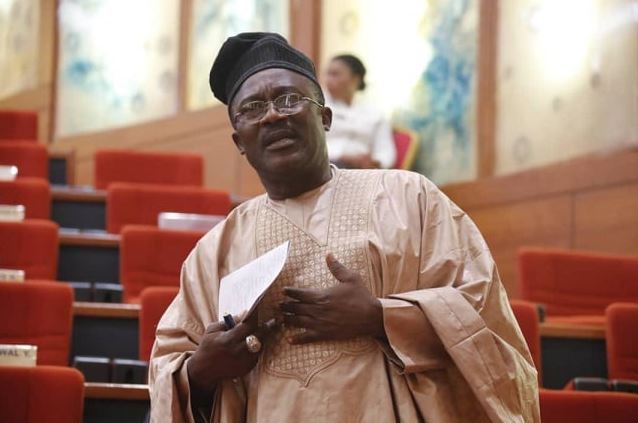Toyin Falola: A transformational figure in Africa's intellectual renaissance, By Bukola Oyeniyi

As we celebrate Mr Falola, we must also confront the deeper question his example poses to all of us: Are we building a nation that values knowledge? Are we raising a generation that sees education as liberation and not just certification? Are our institutions modelling integrity, excellence, and innovation?.. In honouring Falola, we honour the very idea of intellectual patriotism. We affirm that ideas matter. That culture matters. That Africa matters.
In what I can only describe as a moment of visionary alignment, the Adeyemi Federal University of Education has announced that Professor Toyin Falola will deliver the maiden convocation lecture in its new status as a full-fledged university. This is no mere ceremonial gesture — it is a bold, symbolic act that honours the past, affirms the present, and points unflinchingly to the future.
Adeyemi, itself a university in transition, has found in Falola the perfect representation of intellectual evolution and cultural reaffirmation. It is a marriage of purpose. A transformational institution has chosen a transformational figure. The nation — and indeed the continent — must pay attention.
Why This Moment Matters
We live in a time of deep national questioning. The value of education is being debated in town halls and markets. Our institutions are grappling with relevance, funding, and identity in an age of globalisation and digital disruption. In such a climate, the choice of who inaugurates a university’s convocation lecture is profoundly symbolic.
By turning to Mr Toyin Falola, Adeyemi University is sending a clear message: that our educational renewal must be rooted in authenticity, originality, and scholarship that elevates the African experience — not one that merely imitates foreign models. Falola is not just a scholar; he is a movement, a standard-bearer for African intellectual independence and global relevance.
A Life Anchored in Culture and Conscience
Born on 1 January, 1953, in the historic city of Ibadan, Toyin Falola emerged from a cultural capital that shaped his intellectual trajectory. Ibadan, known for its literary heritage and political consciousness, was itself a teacher. Falola’s early participation in the Agbekoya revolt against oppressive taxation and government negligence is testament to a lifelong commitment to justice and social transformation.
At a young age, Falola made the extraordinary choice to leave formal schooling to stand with the oppressed. He aligned himself with a people’s movement, declaring, in effect, that knowledge is not only gathered in classrooms but lived on the streets, in farms, in oral traditions, and in acts of collective resistance. This was not an act of rebellion; it was an initiation into what would become a lifetime of engaged scholarship.
Decolonising the African Mind
Falola belongs to a distinguished intellectual lineage that includes Kenneth Dike, JF Ade Ajayi, Tekena Tamuno, Bolanle Awe, and other pioneers of the Ibadan School of History. These men began the difficult task of decolonising African historiography — of telling Africa’s story on its own terms. But Falola has taken that mission further. His work is not simply corrective; it is regenerative. He has broadened the canvas, deepened the palette, and introduced bold new strokes that have revitalised African scholarship.
Falola has been more than a writer and teacher; he has been a builder. A builder of intellectual networks, of transnational collaborations, of institutions, and of enduring legacies. He has served on various editorial boards, been a fellow of prestigious academies, and chaired international bodies dedicated to African studies. He has received more than thirty honorary degrees, awards, and fellowships…
With over 200 published books and close to 800 scholarly articles, essays, and book chapters, Falola is arguably the most prolific African scholar alive today. But more important than the volume of his output is the depth and daring of its content. His celebrated work, The Power of African Cultures, dismantles colonial distortions and affirms the agency, complexity, and vitality of African traditions. It reframes culture not as an obstacle to development but as its very foundation.
In Decolonizing African Knowledge: Autoethnography and African Epistemologies, Falola goes even further, placing the African self at the centre of knowledge production. With courage and creativity, he blends personal narrative with scholarly analysis to create a form of intellectual expression that is as intimate as it is revolutionary.
Global Reach, Local Relevance
Mr Falola’s name commands respect, not only across Africa but also around the world. His writings appear in libraries from Cape Town to Cairo, Lagos to London; from Manila to Moscow, Nairobi to New York. His voice reverberates in lecture halls, conferences, and community gatherings alike. He has served as a mentor to a generation of African and diaspora scholars, and his influence has shaped entire disciplines.
More recently, Falola has pioneered The Toyin Falola Interviews — a digital forum that brings together intellectuals, artists, writers, and leaders from diverse backgrounds for in-depth conversations about Africa’s past, present, and future. These interviews are not just academic engagements but a democratisation of African thought, conducted in ways that are accessible to the general public. Here, the classroom meets the courtyard.
His ability to straddle traditional scholarship and public intellectualism has made him an enduring figure in both the ivory tower and the street square. Whether through lectures or social media, Falola continues to educate, provoke, and inspire a wide audience that spans generations.
Beyond the Ivory Tower: Cultural Ambassador and Builder of Institutions
Falola has been more than a writer and teacher; he has been a builder. A builder of intellectual networks, of transnational collaborations, of institutions, and of enduring legacies. He has served on various editorial boards, been a fellow of prestigious academies, and chaired international bodies dedicated to African studies. He has received more than thirty honorary degrees, awards, and fellowships – a testimony to the respect he commands globally.
Perhaps more significantly, Falola is a living embodiment of the idea that Africa must tell its own story. He represents a post-colonial generation of scholars who believe that intellectual sovereignty is not just desirable but essential. He has taught and lectured in more than forty countries, connecting continents with the rich, diverse, and dynamic intellectual traditions of Africa.
Through his vast scholarship and global networks, he has transformed what was once considered “peripheral knowledge” into central conversations about global modernity. By doing so, he has turned the margins into the mainstream.
To call him a transformational figure is not an exaggeration. It is a factual summation of decades of influence, innovation, and inspiration. As he mounts the podium at the maiden convocation of Adeyemi Federal University of Education, he is not just giving a lecture; he is performing a rite of passage for a generation that must now pick up the baton and continue the race.
A Legacy in Motion
What sets Professor Toyin Falola apart is not merely what he has achieved, but the principles upon which his scholarship is anchored: justice, authenticity, independence, and African agency. His academic life is a compelling testimony to the idea that scholarship can — and must — have a soul.
To call him a transformational figure is not an exaggeration. It is a factual summation of decades of influence, innovation, and inspiration. As he mounts the podium at the maiden convocation of Adeyemi Federal University of Education, he is not just giving a lecture; he is performing a rite of passage for a generation that must now pick up the baton and continue the race.
His story reminds us that education is not merely about acquiring degrees, but about acquiring the moral imagination to rebuild societies. His life is proof that knowledge is most powerful when it is connected to community, to culture, and to conscience.
Conclusion: A Call to Reflection and Action
Nigeria stands at a crossroads. We are surrounded by challenges — economic, political, moral. But we are also surrounded by possibilities. The life and work of Toyin Falola show us that one of the most powerful tools for transformation is the human mind – properly nurtured, rightly directed, and deeply rooted in cultural identity.
As we celebrate Mr Falola, we must also confront the deeper question his example poses to all of us: Are we building a nation that values knowledge? Are we raising a generation that sees education as liberation and not just certification? Are our institutions modelling integrity, excellence, and innovation?
In honouring Falola, we honour the very idea of intellectual patriotism. We affirm that ideas matter. That culture matters. That Africa matters.
Toyin Falola is not just a scholar. He is a mirror. A standard. A challenge. And most importantly, a promise of what is still possible for African scholarship — and for Africa itself.
Bukola Oyeniyi is associate professor of African History at the Missouri State University, Springfield, MO, USA.
You may also like...
Diddy's Legal Troubles & Racketeering Trial

Music mogul Sean 'Diddy' Combs was acquitted of sex trafficking and racketeering charges but convicted on transportation...
Thomas Partey Faces Rape & Sexual Assault Charges

Former Arsenal midfielder Thomas Partey has been formally charged with multiple counts of rape and sexual assault by UK ...
Nigeria Universities Changes Admission Policies

JAMB has clarified its admission policies, rectifying a student's status, reiterating the necessity of its Central Admis...
Ghana's Economic Reforms & Gold Sector Initiatives

Ghana is undertaking a comprehensive economic overhaul with President John Dramani Mahama's 24-Hour Economy and Accelera...
WAFCON 2024 African Women's Football Tournament

The 2024 Women's Africa Cup of Nations opened with thrilling matches, seeing Nigeria's Super Falcons secure a dominant 3...
Emergence & Dynamics of Nigeria's ADC Coalition

A new opposition coalition, led by the African Democratic Congress (ADC), is emerging to challenge President Bola Ahmed ...
Demise of Olubadan of Ibadanland
Oba Owolabi Olakulehin, the 43rd Olubadan of Ibadanland, has died at 90, concluding a life of distinguished service in t...
Death of Nigerian Goalkeeping Legend Peter Rufai

Nigerian football mourns the death of legendary Super Eagles goalkeeper Peter Rufai, who passed away at 61. Known as 'Do...


